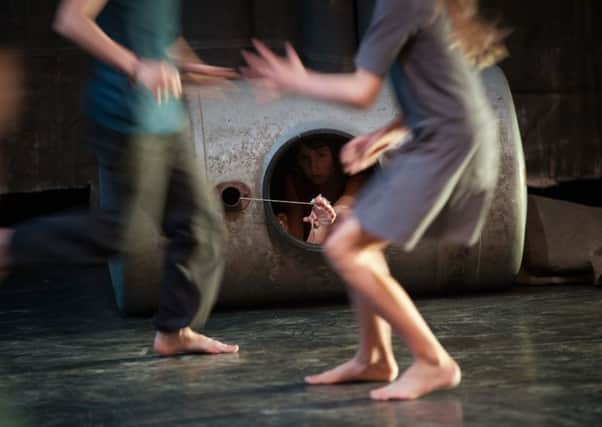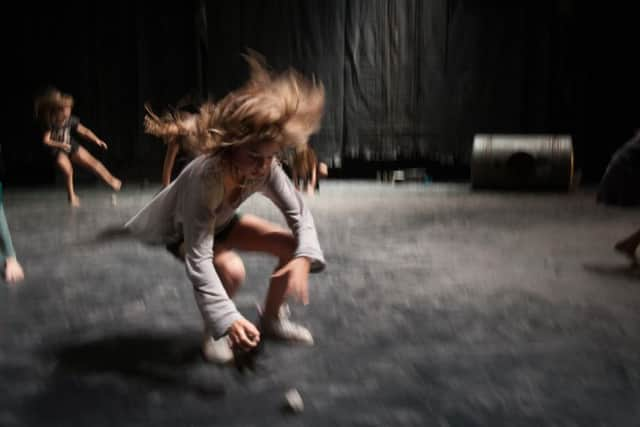Raw will hold its 90th and final performance


It’s not unusual for performers to gather in a bar for a drink after work, full of post-show energy and euphoria. And here I am, sitting on the roof-top terrace of the NT theatre in Ghent, with the cast of Raw doing exactly that. The ice in their glasses clinks, their hair glistens, still damp from the shower, faces aglow after a job well done.
Only the drink in their hands is orange juice, and the performers are all aged between nine and 13. When I ask them about their experience of being in the show, they smile, giggle, look confused and attempt an answer – but it’s hard. Being in Raw is as natural to them as breathing; talking about it is not. For most of them, a third of their young lives has been spent on the show – a year’s rehearsal, followed by three years performing it. Raw is just something you do, like playing with your friends or going to school.
Advertisement
Hide AdAdvertisement
Hide AdExcept when Belgium’s Kabinet K takes to the stage in Edinburgh this week, these seven children will perform Raw for the last time. It will be their 90th performance, and the sadness at saying goodbye to such a huge part of their lives is palpable.


“It will be strange,” says 12-year-old Suza De Gryse, “because we’re so used to it. We’ve been together for so long, and we know that we’ll never be together in this way again.” The others agree, nodding. “There will be a big hole,” says 13-year-old Louisa Vermeire. “A big part of our life will be gone.”
Raw is regularly in demand, both at home and abroad. Shortly before arriving in Edinburgh, the production played at a festival in Japan. So why stop now, when the show clearly still has legs?
“If we hadn’t had these wonderful invitations from Japan and Edinburgh this summer, we would have stopped the show in November last year,” says director and co-founder of Kabinet K, Joke Laureyns. “Because it’s getting harder now: four years ago they were little girls, now they’re becoming young women.”
The age thing is key, because Raw only works if there is a sense of vulnerability about the children. In the show, they live alone, sharing the space with a dirty old mattress, rocks and dripping water. There is no parental involvement, just the presence of two adults who bond with the children, but are not their carers. It’s clear these children are on their own – and have built up considerable resilience in the face of such harsh circumstances.


Laureyns and co-director Kwint Manshoven were inspired by a number of sources, including a short film in which children in Amsterdam looked after themselves on the streets (they were later taken into care), and the 2011 BBC documentary, Poor Kids.
But when they started working with their young cast on Raw, discussing what the show is about took a back seat.
Advertisement
Hide AdAdvertisement
Hide Ad“We don’t talk very much during rehearsals – our method of creating is to play a lot, and find games which contain the spirit of the movement,” explains Laureyns. “And that keeps it light and playful. Only one of the children said to us ‘tell me what this is about, I don’t understand it’ – so we showed her a trailer of the Dutch film, and then we showed it to all of them.
“In the trailer you see children who live on the edge, they play in the mud and nobody is taking care of them. After watching it, we asked the children to write down words, and they came up with ‘free’ and ‘hard’. Then one of them said ‘it’s like Raw’ – and we said yes, that’s what we are doing.”
Four years on, when I ask the children what the show is about they still struggle, but Suza – a dominant force on and off stage – gives it a go.
“In the beginning, people kept asking me what it was about, and I couldn’t tell them because I didn’t really know,” she says. “But now I tell them it’s somewhere between dance and theatre, and it’s about a bunch of kids living somewhere and two adults come into their territory and lots of things happen – and sometimes it’s fun, and sometimes it’s not.”
Everyone agrees that the characters they play on stage are much the same as themselves – it’s their actions that are dramatically different. When I ask for examples, they are quick to respond.
“I never go out into the street in my underwear,” says one girl, “I don’t eat on the floor,” says another, “and I don’t talk with strangers or have holes in my clothes.” All the children agree that life in the Raw world has its pros and cons. On the one hand “it feels free – they can do whatever they want” but on the other “they don’t have parents to make them food, they have to take care of themselves.”
When Laureyns and Manshoven first began working with the children, getting to know them – and for them to know each other – was essential. Not only to make the rehearsal process easier, but because that’s who we see on stage.
Advertisement
Hide AdAdvertisement
Hide Ad“They are themselves but in a different context,” says Laureyns. “But we really tried to colour who they are. And I remember asking them to describe each other in a few words, and they were completely honest. They said Louisa is very caring, Anna is a quiet but beautiful presence, Suza is the boss. And that’s how you see them in the show, they are not pretending.”
Few if any of the children have a dance background – these are no stage school kids. As Laureyns says, “the less dance in their life the better, so we could put our stamp on there and didn’t have to erase something first.”
And Laureyns and Manshoven’s way of working is different from most. They don’t sit around discussing emotions or how the children would feel in a similar situation – nor do they offer exact instructions about how and when to move.
Instead, they give them the confidence to find their own way – and the result is strong, believable movement that feels polished yet, like the show’s title, raw.
“Everything they do comes from their physicality and not from thinking,” explains Laureyns. “That’s why after three years they’re still not able to speak about it. At the end of each performance I give them notes about the show, but we never name the emotion we need them to perform.
“We give them very practical tools – like when Suza is standing in the middle of the stage at the end, we tell her to follow the blood in her veins or imagine a ball running along her arm. We don’t say your arm has to move this way or ‘think of being alone’ – no, we don’t dictate what any of them have to think or feel, it’s all completely physical. And if they’re fully there, and they really try, then it’s good.”
Kabinet K: Raw, Edinburgh International Conference Centre, 27-28 August, times vary.